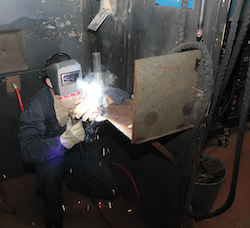 As one of the backbones of modern fabrication, welding provides labor opportunities for workers worldwide. However, the constant availability of these roles in this thriving market fails to convey the difficulty in garnering enough skill to become a welder by trade. Many amateur welders aspire to weld for their full-time occupation without understanding the specific responsibilities and entry paths for a job in the welding world. However, the multitude of available jobs and resources can help facilitate a quick admittance into the world of professional welding. Professional welding training can be obtained in as quickly as 7 months!
As one of the backbones of modern fabrication, welding provides labor opportunities for workers worldwide. However, the constant availability of these roles in this thriving market fails to convey the difficulty in garnering enough skill to become a welder by trade. Many amateur welders aspire to weld for their full-time occupation without understanding the specific responsibilities and entry paths for a job in the welding world. However, the multitude of available jobs and resources can help facilitate a quick admittance into the world of professional welding. Professional welding training can be obtained in as quickly as 7 months!
As referenced above, the fabricating industry employs more welders than any other field, and for obvious reasons. Fabrication in the 21st century would be impossible without the skills of welders, and this fact is unlikely to change within the next century. Welders in these roles can expect to find themselves utilizing their education to assemble consumer goods like toys and electronic devices. On a wider scale, assembly welders serve a crucial role in society by manufacturing transportation vessels like boats, airplanes, cars and even rockets.
The fact that welding is integral to construction allows new welders to search for a job virtually anywhere – local, within the same country and even overseas. Large construction projects in urban environments can hire hundreds of welders at a time because of the amount of metal necessary for the massive structures being built and repaired. While a fear of heights may cause some welders to stray away from this kind of job, there are many other positions that do not require scaling scaffolding.
Boilermakers serve as perhaps the third most prominent welding workers in today’s marketplace. Obviously, the etymology for this role is derived from their historical responsibility of manufacturing boilers. Currently, the term “boilermaker” also includes the production of tanks and closed vats into the wider umbrella of duties. This job requires high specialization and training, and often requires that the welder travel to the worksite to complete their job. In addition, it can be physically demanding. The welder often times works in a small space surrounded in extremely high temperatures. A high level of dedication to one’s craft is necessary to hold this job, but it can also be very rewarding.
There are also fulfilling jobs in welding for those that don’t find industrial environments or constant travel appealing. If one possesses high technical skill as a welder, it could be advisable to seek a job as a jeweler or precious stone worker. Working with jewelry demands a careful hand and a keen eye. Most of the clientele for this line of work will be creating, repairing or reworking expensive pieces of jewelry with the ambition of raising the value further. As a result, mistakes in this role could be very costly.
Some of the most lucrative welding jobs demand international travel to work on important projects. While these jobs ask that the welders possess higher levels of training and skill, these welders often bring home salaries in excess of six figures annually. For example, professional underwater welders must pass extensive physical exams and diving training as part of the hiring process. However, these welders are highly sought after by employers in the gas and oil pipeline industry, as well as from shipyard and naval industries.
The expansive American military is one of the nation’s largest employers. As a truly global operation, the US military requires trained welders to manufacture and repair the industrial equipment on bases both domestically and overseas. Travelling to warzones threatens a higher risk of danger than any other welding job, but these welders earn the highest compensation of any welding job. The military invests highly into their facilities, weapons, and vehicles; welders are adequately salaried for protecting these investments.
Large companies also invest huge sums of money into their facilities. To ensure that these facilities operate at the highest level, companies employ traveling welders to shut down their various plants to inspect and repair the machinery at each location. Welders in this role are appropriately dubbed “industrial shutdown welders”, and each individual plant could require several months of work. Industrial shutdown welders are unique in that they typically travel and work with very few days off for 6 months out of the year and spend the remaining 6 months of the year relaxing.
A job in motorsports could be the perfect job for an efficient welder with the desire to travel. All motorsport pit crews employ welders, as racers require quick service if any of the metal components of their chosen vehicle break or fail in some way. A welder in these crews will be able to travel with the racing crew and enjoy the entertainment of the races, but they face a high degree of pressure to work quickly and effectively whenever their name is called upon. Any mistakes in this role could prove to be disastrous, so only expert welders should search for jobs in this field.
Due to the vast expanse of the welding world, it is nearly impossible to list all of the possible employment opportunities for welders in a single article. However, if the reader’s mind has ever contemplated searching for a career in welding, they are hopefully encouraged that there are opportunities for their skillset in countless industries all over the globe!
© 2024 Aquasol Corporation. All Right Reserved.
